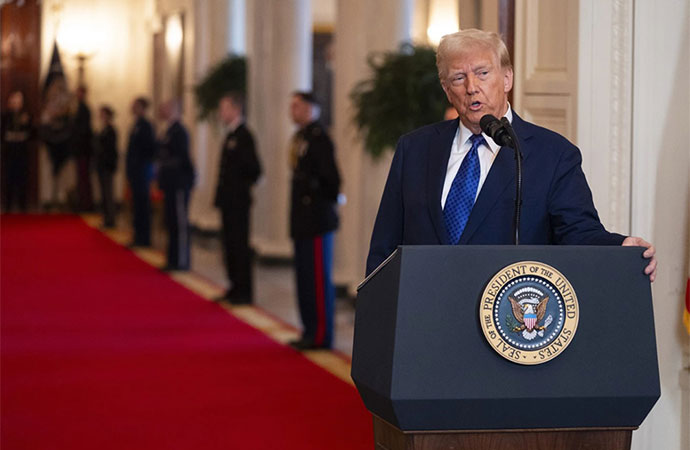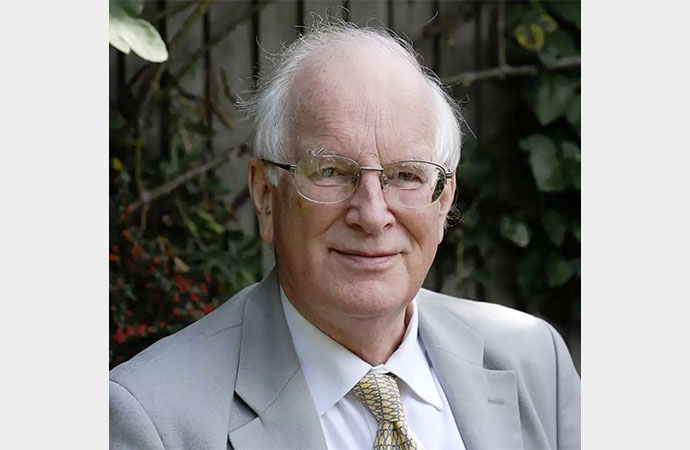Column

President Donald Trump speaks before signing the Laken Riley Act in the East Room of the White House, Wednesday, Jan. 29,2025, in Washington. Photo: AP/UNB
In a recent article, the Financial Times columnist Simon Kuper invokes the scholar Robert Kagan's metaphor of international relations as a jungle which is growing back. Kagan's book, The Jungle Grows Back, was published in 2018, the year following the arrival of Donald Trump at the White House. Now, as the second Trump presidency takes off, Kuper worries that the world is moving from being a petting zoo (where nobody is allowed to eat the animals on display) to becoming a raw place where "Donald Trump is emptying out the zoo into the wild". The crux of Kuper's argument: "Trump, an instinctive predator, was never going to be a zookeeper. He wants the US to act like a canny, low-risk lion that only attacks or steals the food of defenceless small prey." Correspondingly, America's acceptance of the brute agency of power in the international jungle makes it respectful of its "two fellow apex predators", China and Russia, the three countries having avoided major wars with one another so as to reign in a jungle where they may devour weaker creatures (my words and not Kuper's).
Kuper provides an excellent example of the power of analogy in the analysis of international affairs. From the Hobbesian analogy of human life as a biological travesty of moral justice - because life is nasty, brutish and short whereas human thought refuses to be bounded by the laws of the flesh - to the uplifting cadences of Rousseau's belief in the possibilities of a liberal international order, and to the Kantian belief in perpetual peace through the human capacity for social (and hence international) organisation, the study of international relations is actually a study of human consciousness in its dealings with the state, and of the state in its dealings with other states.
In contemporary times, E.H. Carr's masterly The Twenty Years' Crisis (published in 1939, the year when World War II broke out), helped to re-initiate realism as a way of understanding inter-state conflict as essentially a struggle over wealth and power in which the national interest was superseded by the expansive interests of capital and the popular resistance to it. Carr's emphasis on historical realism continued the tradition of Thucydides' classical realism, which had argued that states are concerned primarily with their own security, which leads them to prioritising the collection of resources and the building of armies over the provision of public goods. Fear, honour and profit make conflict inevitable among states, the Greek Thucydides had argued. Warring centuries later, the British Carr explained how fear and honour were themselves born out of the quest for profit and not the other way around.
Many essential theories other than historical realism have been expounded since the advent of classical realism. There is structural realism, or neorealism, with its two offshoots of defensive realism and offensive realism; liberalism; and constructivism. Some of those theories were manufactured or refined in the context of the Cold War, when the material and military contest between the United States-led First World and the Soviet Union-led Second World threatened to consign the rest of the world as well, including the Third World, to a burning inferno of history.
The fall of the Berlin Wall and the implosion of the Soviet Union ended the Cold War decisively to America's advantage, allowing it to emerge as a hyperpower.
But uninhibited excess of power never lasts, and China and the rump Soviet Union (in the form of Russia) have emerged as the chief challengers of the United States in the international jungle that is growing back.
Hence the timeliness of Kuper's observations on a Trumpean world. Along with Kagan, he is a necessary prophet of doom. Only such prophets can help mortals seek security in the real world, not in an illusory world made up of fairy-tale words such as democracy, liberty, justice and peace.
What may smaller states such as Bangladesh do in the circumstances? To say that they must be realist is to suggest that their foreign policy and defence establishments are not realist, which is both insulting and untrue. All states are realist: What matters is the kind of realism they practise. That depends in turn on the kind of realism that great powers practise. Like it or not, they are the final architects of the international order (or disorder).
The two strands of structural realism or neorealism are defensive and offensive. Steven E. Lobell explains the difference between the terms lucidly in his essay in the journal, International Studies. "On the one hand, offensive realism seeks power and influence to achieve security through domination and hegemony. On the other hand, defensive realism argues that the anarchical structure of the international system encourages states to maintain moderate and reserved policies to attain security."
Clearly, the United States has veered towards offensive realism in its dealings with China by securitising their economic relations and weaponising the dollar as the tool of American dominance in the global political economy. This trend began even before the first Trump Administration, but it accelerated it by seeking to decouple the American economy from the Chinese one. Today, the feared return of the wilderness in Trump 2.0 will exacerbate the divide between the world's two most powerful nations. They will keep the peace between themselves, but other countries will be expendable, pawns in proxy wars fought or unfought.
In this context, the realism that will be expected of smaller nations will be that of the most agile smaller animals in the international jungle. I would like to call this "interstitial realism". That is, smaller countries should be able to work within several contending international orders, extant or envisaged. Bangladesh, for example, would need to see how it could fit into the divergent orders promoted by the United States. China, Russia (and India).
The good thing about Kuper's and Kagan's international jungle is that even weaker species survive in it, in the spaces between the territorial ferocity of predators.
Let us wish ourselves well.
The writer is Principal Research Fellow of the Cosmos Foundation. He may be reached at epaaropaar@gmail.com

























Leave a Comment
Recent Posts
Pedaling Through the Mangroves ...
The journey from the bustling streets of Barishal to the serene, emera ...
Why the Interim Government mus ...
Two weeks out from what is expected to be a red letter day in the figh ...
Doesn’t matter who thinks what about Bangladesh deci ..
The Other Lenin
US President Donald Trump said his administration
Govt moves to merge BIDA, BEZA, BEPZA, MIDA